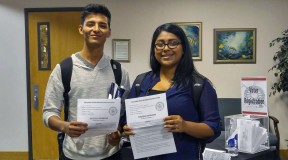Su Voto: Latino vote poised for dramatic impact on elections

Though Oklahoma’s Hispanic population has grown to more than 378,000, far less than half of the Hispanic population’s eligible voters cast ballots, an analysis by the Pioneer shows.
Projections show that 27.3 million Hispanics are eligible to vote in the 2016 presidential elections. The Hispanic population is the fastest growing ethnic group — both in the state and on a national level — But Hispanic voters continue to lag behind other ethnic groups, with one of the lowest voter turnouts at the polls.
Only 48 percent of eligible Hispanics voted in the 2012 presidential election according to a study by the Pew Research Center. The same trend is visible in state.
Locally
Oklahoma is 25th in the nation in largest Hispanic statewide eligible voters. This means that 138,000 Hispanics are eligible to vote, compared to New Mexico who ranks first with 40 percent of eligible voters.
“We have the numbers, we can make a difference but we have to educate the Latino community that their vote counts,” said Arturo Delgado, the Laborers’ International Union of North America Field Representative. “If the Hispanic community would go out and vote, the first Latina could be voted into office in Oklahoma.”
Many times people think that because they’re not a citizen they feel like they can’t participate in the political process, Delgado said. “It doesn’t matter, you can put a yard sign out, volunteer, or donate. It may not seem like a lot but when 30 people give that candidate $20, now he can print his literature.”
Oklahoma City attorney Lambert D. Dunn Jr. said Oklahoma City’s Hispanic community lacks a group of unified leaders who will educate the community on the political process. Dunn’s clientele is about 90 percent Hispanic.
“If one of those elections comes out the right away, policies will start to change,” Dunn said. “There is no reason that southside Oklahoma City does not have a Hispanic representative if they wanted one.”
The impact the Hispanic community can have on local politics was seen in 2014 when Michael Brooks-Jimenez, a Democrat, ran for Senate District 44 against incumbent Republican Ralph Shortey.
“He came close to winning, if more Hispanic voters would’ve turned out, he could have won. He was only a few hundred votes short,” Dunn said.
Both Dunn and Delgado believe that more Hispanics would vote if there were an organization that helped educate members of the community about the voting process. Delgado said he first began getting involved in state politics through his job.
He said he was brought to the United States when he was three years old. Later he became a resident and is now a citizen active in the political process. After working on construction sites, Delgado became a field rep for the Laborers’ Union Local 107.
“I think we are doing it, slowly, especially with the younger generation in high school and college students. They’re the ones getting involved,” Delgado said.
Currently, he is coordinating union workers to help campaign for two candidates, Mickey Dollens, a Democrat, who is running for State Representative for District 93 and Cindy Munson, a Democrat seeking re-election for House District 85.
“Recently, I helped a few young Latinos register and the change isn’t going to happen over night. But if we slowly help facilitate and educate the young generation, we’ll eventually get to where we want to be,” Delgado said.
Delgado is also a board member for LULAC, a national Hispanic organization. He said he hopes to create a group by fundraising and structuring it so that the group can collect data to use to reach Hispanic voters during election years.

Nationally
Another fast growing voter group is Hispanic millennials, said Sharon Vaughan, Oklahoma City Community College political science professor.
Of the 27.3 million Hispanic eligible voters for the 2016 presidential election, the Pew Research Center shows that 44 percent are Hispanic millennials.
Vaughan said there are three battleground states for the 2016 presidential elections: Florida, Colorado and Nevada. She said the impact that U.S. citizens of Puerto Rican descent can have in Florida if they show up to the voting booth.
“Because of the financial crisis and bankruptcy happening in Puerto Rico, 130,000 people have left the island and migrated to Florida,” Vaughn said. “And we forget that these people are born U.S. citizens. They have so much power if they use it.”
Socioeconomics plays a big role in voter turnout, Vaughan said. “Two of the best predictors is education level and income. The higher the education level and income, the most likely a person votes.”
But the 2016 elections are no ordinary elections.
“If the discourse we’ve witnessed in the past few months hasn’t motivated any millennial, I don’t know what will motivate them to vote.”
The big question that cannot be answered until after the 2016 elections is, will Hispanics turn out to the polls?